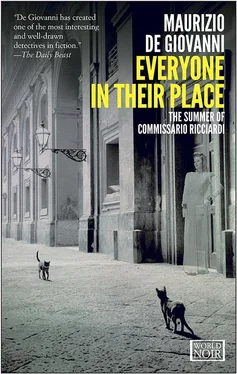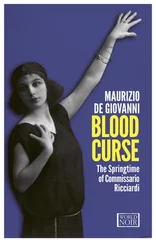Maurizio de Giovanni - Everyone in Their Place
Здесь есть возможность читать онлайн «Maurizio de Giovanni - Everyone in Their Place» весь текст электронной книги совершенно бесплатно (целиком полную версию без сокращений). В некоторых случаях можно слушать аудио, скачать через торрент в формате fb2 и присутствует краткое содержание. Жанр: Исторический детектив, Полицейский детектив, на английском языке. Описание произведения, (предисловие) а так же отзывы посетителей доступны на портале библиотеки ЛибКат.
- Название:Everyone in Their Place
- Автор:
- Жанр:
- Год:неизвестен
- ISBN:нет данных
- Рейтинг книги:4 / 5. Голосов: 1
-
Избранное:Добавить в избранное
- Отзывы:
-
Ваша оценка:
- 80
- 1
- 2
- 3
- 4
- 5
Everyone in Their Place: краткое содержание, описание и аннотация
Предлагаем к чтению аннотацию, описание, краткое содержание или предисловие (зависит от того, что написал сам автор книги «Everyone in Their Place»). Если вы не нашли необходимую информацию о книге — напишите в комментариях, мы постараемся отыскать её.
Everyone in Their Place — читать онлайн бесплатно полную книгу (весь текст) целиком
Ниже представлен текст книги, разбитый по страницам. Система сохранения места последней прочитанной страницы, позволяет с удобством читать онлайн бесплатно книгу «Everyone in Their Place», без необходимости каждый раз заново искать на чём Вы остановились. Поставьте закладку, и сможете в любой момент перейти на страницу, на которой закончили чтение.
Интервал:
Закладка:
The disappointment came from the experience of once again looking out on the inferno of the human soul and the corruption of the passions: the same as before, nothing new.
Last of all, the anger came from the forced realization, yet again, of the pointlessness of what he was doing: in fact, what had he achieved by discovering that Sofia Capece had killed Adriana Musso di Camparino? He had merely ensured that now two children would have a mother locked up in a criminal mental asylum, while the duchess remained dead.
Sometimes, he thought, as he wrote up the report of the murderess’s confession, the solution is much worse than the problem. And there’s never a solution for the solution. By a process of mental association, the figure of the victim appeared before him, as he was condemned to see her.
This is how it always was: the following day he faced his reckoning with the Deed. Aside from confessions and evidence, proof and details, the Deed itself presented its invoice to his soul and demanded attention. He glimpsed Adriana again, beautiful and proud even as a corpse, with the bullet hole between her eyes, her arms hanging limp at her sides. And the phrase, repeated obsessively:
“ The ring, the ring, you’ve taken the ring, the ring is missing. ”
And so, in the end, the contest between the two dueling rings had gone to the one that Capece had torn off her ring finger at the theater. It was clear: the duchess had recognized Sofia right before dying and her mind had begun to establish a link with the object that had once belonged to her killer; before the bullet tore through her brain and put an end to this and any other thought.
And yet, Ricciardi mused, someone had torn the other ring off the now-dead duchess’s finger; and Modo’s autopsy mentioned signs of violence on her body, as if there had been a struggle that Sofia Capece had said nothing about. True: the woman was insane, and it might well be that the gunshot had come in the wake of a fight. Perhaps the madwoman simply forgot that part after emerging victorious, or maybe she chose not to say anything about it.
After lightly rapping, Maione opened the door and came in.
“Good morning, Commissa’. How are we doing, this fine day? That’s some heat we’ve got, eh? Are you writing the report on the confession?”
Ricciardi greeted the brigadier with a nod of the head.
“Yes, I’m writing it. And the more I think about it, the sadder it seems to me for those two kids, who didn’t used to have a father and now don’t have a mother either.”
Maione shrugged.
“Eh, I know it, it’s a sad thing. You’re right. But on the other hand, someone killed her: the duchess. And at a certain point I was afraid that it might well have been the boy, Andrea.”
Sure, thought Ricciardi: Andrea. He was a strong, powerful young man, and he could certainly have helped his mother in what she did at Palazzo Camparino. And then the woman could have covered up for him, or even forgotten that he was there too. It was very possible.
Just as he was about to answer Maione, the door swung open and a euphoric and highly scented Garzo made his entrance, followed by Ponte who took turns looking at the floor and the ceiling.
“Ricciardi, bravo, bravissimo , a thousand times bravo! You were brilliant, I have to say it: truly brilliant. And bravo to you too, Maione.”
Ricciardi looked at the deputy chief of police with his pen still in his hand, dripping ink onto the report.
“And why do you say that, Dottore? Brilliant seems like a strong word, I don’t think I’ve done anything remarkable.”
Garzo had no intention of letting his enthusiasm subside one inch:
“Brilliant is what I said and brilliant is what I meant! You have no idea how worried we were, the chief of police and I. We were afraid it would turn out that the murderer of the duchess of Musso di Camparino was actually a member of her family, one of the most important families in the city; perhaps even the son, Heaven forefend, who I hear has friends in very high places that. . well, enough said. Or else it could have been Capece, a prolific and indiscreet journalist who might even be a dissident, and then we would have been attacked by his fellow journalists, who are just champing at the bit. But instead, who do you nail for the murder? His wife! Which means he has to shut up and take it, and all his friends and colleagues can’t do anything else but pity him, while the Camparino family emerges scot-free. Bravo, Ricciardi! Once again, we’re proud of you!”
Maione emitted a faint hiss, like a steam boiler whose pressure was too high. Ricciardi replied coldly:
“I’m pleased to hear how happy it makes you, Dottore, that one woman is dead and that another, the mother of two childen and a faithful, loving wife, will be confined to a criminal asylum, possibly for the rest of her life. I’m pleased that it turns out to be a relief, for you, that two families have been ruined forever, and that shame will blot their names for many years to come. And I’m sorry to inform you that it wasn’t us who crafted this solution, but merely the demon of a corrupt and desperate passion.”
A profound silence followed the commissario’s words. Through the open window came the sound of a departing ship’s horn. Ponte had turned practically purple and was staring in fascination at a patch of peeling plaster on the wall. Garzo swallowed and turned to Maione, with an air of complicity:
“Always modest, eh, our man Ricciardi. Always refusing to take credit for a brilliant solution. Of course, it’s a pity that people die, and that there are still murderers, even in these times when we ought to be focusing on the luminous future that awaits us. Luckily for everyone, we’re here, taking care of things; we find the guilty parties and put them behind bars. You, too, Maione, you did a beautiful job. If you come to my office and you give me the details of what happened, I’m pretty sure that I’ll be able to arrange for you to receive a generous bonus.”
Diplomacy was not one of Maione’s gifts; his face seemed to be a billboard for disgust.
“No, Dotto’, forgive me but I’ve got something urgent to do.”
“And what would that be?” asked Garzo.
“I have no idea,” Maione replied, “but it must be urgent, whatever it is. With your permission, I’ll be going.”
And he left the room, touching his fingertips to the visor of his cap. Garzo, pigeon-chested and all smiles, turned and spoke once again to Ricciardi, who hadn’t moved in the meantime:
“All right, Ricciardi, I’ll be expecting that report. Again, congratulations, and on to bigger and better things. Come along, Ponte: we have a thousand things to do.”
Ricciardi’s sense of unease, increased considerably by the visit from the deputy chief of police, led him to go out into the street even before lunchtime. Pensive and unhappy, he found himself in front of the hospital, just as Doctor Modo was heading out for a bite to eat.
“There you go, the story of my life. All my colleagues are greeted at the front gate by lovely women, either enchanting girlfriends or loving wives. And here I am, awaited by you: a melancholy policeman, and ugly, to boot.”
“Stop complaining, Bruno: I don’t recall having to stand in line to buy you lunch.”
Modo tipped his hat to the back of his head and mopped his brow with his handkerchief.
“Better alone than in bad company. In any case, I swore an oath to fight suffering, and as far as I can tell you’re the unrivaled champion of misery; and so, though it’s with a heavy heart, I’m going to take you up on your offer. After all, you’re a wealthy man, and I’m just a penniless medical examiner. Where are you taking me for lunch?”
Читать дальшеИнтервал:
Закладка:
Похожие книги на «Everyone in Their Place»
Представляем Вашему вниманию похожие книги на «Everyone in Their Place» списком для выбора. Мы отобрали схожую по названию и смыслу литературу в надежде предоставить читателям больше вариантов отыскать новые, интересные, ещё непрочитанные произведения.
Обсуждение, отзывы о книге «Everyone in Their Place» и просто собственные мнения читателей. Оставьте ваши комментарии, напишите, что Вы думаете о произведении, его смысле или главных героях. Укажите что конкретно понравилось, а что нет, и почему Вы так считаете.












